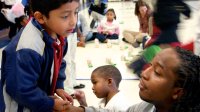Why It Matters: Social and Emotional Learning After School
Teaching the basics of communication, confidence, and conflict resolution helps prep students for success in school and life.
Your content has been saved!
Go to My Saved Content.Chicora Elementary sits in scruffy North Charleston on a side road named -- ironically, given its potholes and the run-down homes nearby -- Success Street. North Charleston endures more than twice the rate of violent crime as neighboring Charleston, and 94 percent of Chicora students qualify for free or reduced-price lunches. Some 129 of the school's 416 students participate in WINGS for Kids, and the after-school program's waiting list here is still 20-plus names long. The neediest kids -- those with behavior problems, poor grades, or homes in such chaos that no adult is cooking them dinner at night or waking them in the morning -- get priority.
The week before my visit last winter, a 17-year-old boy from another school in North Charleston had been killed by a gunshot to the head, allegedly by another student, age 14. The daily counseling sessions that the shooter had been attending weren't enough to prevent his crime, which shows how incredibly important it is to teach coping skills to even our youngest children, says Charleston County School District Superintendent Nancy McGinley. "The earlier you start, the easier it is and the more ingrained it becomes in them."
That said, the lessons in the WINGS creed could probably benefit anyone. WINGS teacher Raymond Harris uses them to navigate problems with his girlfriend. Executive Director Bridget Laird says there's no doubt that they've made her a better parent. And the very idea of WINGS was born out of the emotional challenges in founder and CEO Ginny Deerin's own life.
Deerin, a former marketing executive and professional fundraiser, was grappling with the end of a long-term relationship and facing a crossroads in her career. She walked out of a counseling appointment one day feeling thankful for the self-awareness she'd only just learned and thought, "Wouldn't it be great if you learned these things before you're even a teenager? Why wait until you're in your forties?"
With limited time and money, she decided to focus on children who might not have anyone else to teach them.
